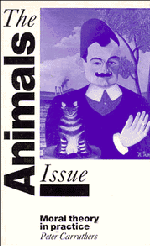Book contents
- Frontmatter
- Contents
- Preface
- 1 Moral argument and moral theory
- 2 Utilitarianism and contractualism
- 3 Utilitarianism and animal suffering
- 4 Utilitarianism and the harm of killing
- 5 Contractualism and animals
- 6 Animals and rational agency
- 7 Contractualism and character
- 8 Animals and conscious experience
- Conclusion
- Notes
- Index
- Frontmatter
- Contents
- Preface
- 1 Moral argument and moral theory
- 2 Utilitarianism and contractualism
- 3 Utilitarianism and animal suffering
- 4 Utilitarianism and the harm of killing
- 5 Contractualism and animals
- 6 Animals and rational agency
- 7 Contractualism and character
- 8 Animals and conscious experience
- Conclusion
- Notes
- Index
Summary
It is time to pull together the threads of my argument, and briefly to set out my conclusions. In doing this I shall by-pass the position defended in Chapter 8, that the mental states of animals are non-conscious ones. For this is, at the moment, too highly speculative to serve as a secure basis for moral practice. The contents of that chapter may best be regarded as suggestions for further research.
My main argument against the moral standing of animals is that some version of contractualism provides us with the most acceptable framework for moral theory, and that from such a perspective animals must fail to be accorded direct rights, through failing to qualify as rational agents. While contractualism allows that we do have duties towards animals, these only arise indirectly – on the one hand, out of respect for the feelings of animal lovers, and on the other hand, through the good or bad qualities of character that animals may evoke in us. Most importantly, this position is not undermined by failure to accord direct rights to those human beings who are not rational agent's, since such rights are in fact granted through a version of slippery slope argument, as well as through an argument from social stability.
- Type
- Chapter
- Information
- The Animals IssueMoral Theory in Practice, pp. 194 - 196Publisher: Cambridge University PressPrint publication year: 1992



